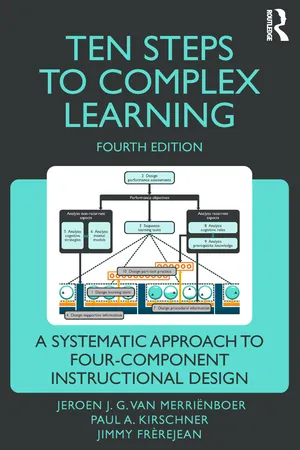
Ten Steps to Complex Learning
A Systematic Approach to Four-Component Instructional Design
- 462 pages
- English
- ePUB (mobile friendly)
- Available on iOS & Android
Ten Steps to Complex Learning
A Systematic Approach to Four-Component Instructional Design
About this book
Ten Steps to Complex Learning presents a path from an educational problem to a solution in a way that students, design practitioners, and researchers can understand and easily use. Students in the fields of instructional design and the learning sciences can use this book to broaden their knowledge of the design of training programs for complex learning. Practitioners can use this book as a reference guide to support their design of courses, curricula, or environments for complex learning.
Driven by the acclaimed Four-Component Instructional Design (4C/ID) model, this fourth edition of Ten Steps to Complex Learning is fully revised with the latest research, featuring over 50 new references. The entire book has been updated for clarity, incorporating new colorful graphics and diagrams, and the guiding example used throughout the book is replaced with a training blueprint for the complex skill of "producing video content." The closing chapter explores the future development of the Ten Steps, discussing changes in teacher roles and the influence of artificial intelligence.
Frequently asked questions
- Essential is ideal for learners and professionals who enjoy exploring a wide range of subjects. Access the Essential Library with 800,000+ trusted titles and best-sellers across business, personal growth, and the humanities. Includes unlimited reading time and Standard Read Aloud voice.
- Complete: Perfect for advanced learners and researchers needing full, unrestricted access. Unlock 1.4M+ books across hundreds of subjects, including academic and specialized titles. The Complete Plan also includes advanced features like Premium Read Aloud and Research Assistant.
Please note we cannot support devices running on iOS 13 and Android 7 or earlier. Learn more about using the app.
Information
Table of contents
- Cover
- Half Title
- Title
- Copyright
- Dedication
- Contents
- About the Authors
- Preface
- Acknowledgments
- 1 A New Approach to Instruction
- 2 Four Blueprint Components
- 3 Ten Steps
- 4 Step 1: Design Learning Tasks
- 5 Step 2: Design Performance Assessments
- 6 Step 3: Sequence Learning Tasks
- 7 Step 4: Design Supportive Information
- 8 Step 5: Analyze Cognitive Strategies
- 9 Step 6: Analyze Mental Models
- 10 Step 7: Design Procedural Information
- 11 Step 8: Analyze Cognitive Rules
- 12 Step 9: Analyze Prerequisite Knowledge
- 13 Step 10: Design Part-Task Practice
- 14 Domain-General Skills
- 15 Programs of Assessment
- 16 Closing Remarks
- Appendix 1
- Appendix 2
- Glossary
- References
- Author Index
- Subject Index